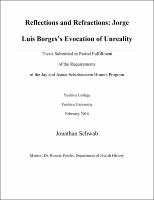Please use this identifier to cite or link to this item:
https://hdl.handle.net/20.500.12202/4099Full metadata record
| DC Field | Value | Language |
|---|---|---|
| dc.contributor.author | Schwab, Jonathan | |
| dc.date.accessioned | 2018-11-06T18:57:20Z | |
| dc.date.available | 2018-11-06T18:57:20Z | |
| dc.date.issued | 2014-02 | |
| dc.identifier.uri | https://hdl.handle.net/20.500.12202/4099 | |
| dc.identifier.uri | https://ezproxy.yu.edu/login?url=https://repository.yu.edu/handle/20.500.12202/4099 | |
| dc.description | The file is restricted for YU community access only. | |
| dc.description.abstract | Born in Argentina in 1899, Jorge Luis Borges inherited the Spanish culture of his mother’s family, mixing it evenly with his father’s half-English roots throughout a life in South America and Europe. Reading fluently in multiple languages even from a young age, Borges achieved success as a man of letters in a wide variety of contexts: as a translator, poet, essayist, and, not least of all, short story writer. More than anything, though, his work came to be defined by the way in which he handled the intersections and overlaps of different areas: the various genres of creative work, the combination of cross-national cultures embodied in his heritage, and especially the philosophical ideas represented by the merging of the real and unreal in fiction. His ability to transcend traditional boundaries has been noted by many, and some have even pointed to it as an essential characteristic of Borges. The transnational nature – of both that which influenced him and his readership – distinguishes Borges and makes him one of the more visible emerging writers of postmodernism. He broke sharply from the traditions of Latin American literature and looked beyond its boundaries, which some see this as a transcendence of Latin America: Livon-Grossman describes Borges as “‘closer’ to the English language than any other twentieth-century Latin American author, a cultural figure without national boundaries” (Livon-Grossman 1). Livon-Grossman’s view picks up the thread of a narrative told about the Argentine master: that he was the model of a new cosmopolitanism of literature and culture, a “Renaissance Man” of the twentieth century. | en_US |
| dc.description.sponsorship | Jay and Jeanie Schottenstein Honors Program | en_US |
| dc.language.iso | en_US | en_US |
| dc.publisher | Yeshiva College | en_US |
| dc.rights | Attribution-NonCommercial-NoDerivs 3.0 United States | * |
| dc.rights.uri | http://creativecommons.org/licenses/by-nc-nd/3.0/us/ | * |
| dc.subject | Borges, Jorge Luis, 1899-1986 --Criticism and interpretation. | en_US |
| dc.title | Reflections and Refractions: Jorge Luis Borges’s Evocation of Unreality | en_US |
| dc.type | Thesis | en_US |
| Appears in Collections: | Jay and Jeanie Schottenstein Honors Student Theses | |
Files in This Item:
| File | Description | Size | Format | |
|---|---|---|---|---|
| Jonathan-Schwab.pdf Restricted Access | 242.34 kB | Adobe PDF |  View/Open |
This item is licensed under a Creative Commons License

